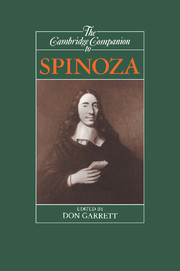Book contents
- Frontmatter
- Introduction
- 1 Spinoza's life and works
- 2 Spinoza's metaphysics
- 3 Spinoza's theory of knowledge
- 4 Spinoza's natural science and methodology
- 5 Spinoza's metaphysical psychology
- 6 Spinoza's ethical theory
- 7 Kissinger, Spinoza, and Genghis Khan
- 8 Spinoza's theology
- 9 Spinoza and Bible scholarship
- 10 Spinoza's reception and influence
- Bibliography
- Index
3 - Spinoza's theory of knowledge
Published online by Cambridge University Press: 28 May 2006
- Frontmatter
- Introduction
- 1 Spinoza's life and works
- 2 Spinoza's metaphysics
- 3 Spinoza's theory of knowledge
- 4 Spinoza's natural science and methodology
- 5 Spinoza's metaphysical psychology
- 6 Spinoza's ethical theory
- 7 Kissinger, Spinoza, and Genghis Khan
- 8 Spinoza's theology
- 9 Spinoza and Bible scholarship
- 10 Spinoza's reception and influence
- Bibliography
- Index
Summary
The human mind is part of the infinite intellect of God.”
(E 2pII)cSpinoza's theory of knowledge is a strange and hybrid creature. An organic, inseparable part of his total philosophical system, it blends highly distinctive, original (even bizarre) formulations with both “modern” - especially Cartesian - influences, and ideas and aspirations rooted in much older thought.
Many recent commentators on Spinoza's epistemology have particularly stressed the Cartesian background of Spinoza's position, presenting him as evolving his own views in response to what he perceived as deficiencies in Descartes's. Up to a point this approach is a sensible one. Fundamental features of Spinoza's framework and terminology do clearly derive from the Cartesian philosophy,- and much that Spinoza says about such topics as skepticism, certainty, judgment, and “ideas” is unquestionably directed against Descartes. Further, focusing on those features of Spinoza's epistemology that can plausibly be represented as deliberate alternatives to well-known tenets of the Meditations (and related works of Descartes’s) helps domesticate the epistemological elements of the Ethics, releasing them from their exotic theological/moral/eschatological context, and qualifying Spinoza as a comprehensible disputant in recognizably modern debates about knowledge.
- Type
- Chapter
- Information
- The Cambridge Companion to Spinoza , pp. 89 - 141Publisher: Cambridge University PressPrint publication year: 1995
- 15
- Cited by

